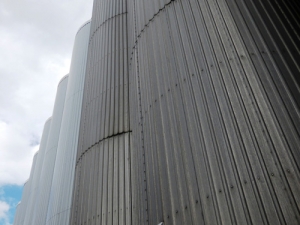EECA funding helps winegrowers adopt solar and battery systems
Winegrowers interested in exploring solar and battery systems on their vineyards could tap into funding and advice through a new funding programme.
 The innovative milk chilling system not only saves the quality of a Waikato farmer's milk, but also his power bill.
The innovative milk chilling system not only saves the quality of a Waikato farmer's milk, but also his power bill.
Looking for a new milk cooling system on farm to ensure you meet new regulations coming into effect mid-2016? Then you must visit the Meddo Farm in Waitoa today.
An innovative milk chilling system that not only saved the quality of a Waikato farmer's milk, but also his power bill, will be displayed at the farm.
The Vari-COOL chilling system was designed by Hamilton based refrigeration specialist, Coolsense, and part-funded by the Energy Efficiency and Conservation Authority (EECA) as part of its technology demonstration programme.
Meddo Farm in Waitoa was faced with a problem last summer after water quality issues forced owner Hans Geessink to find a new water supply for his dairy farm. However, when Geessink put down a new bore the temperature of the water he found there was 26 degrees Celsius, six degrees higher than his previous supply.
"We had our hands up against our back," Geessink says.
"It meant we could no longer comply with the current milk chilling standards and we ran the real risk of our milk being rejected by the dairy company. We needed to find a milk snap chilling system that could cope with the increased demand without our power bill going through the roof."
After investigating several options, Geessink decided on the Vari-COOL system and it was installed on his farm in May. Immediately there was a marked difference in his milk temperature at time of pick-up, from 8 degrees Celsius to 4 degrees. Moreover, while the higher water temperature increased the milk cooling requirement by 30%, energy consumption on Meddo Farm has remained the same as the previous year.
EECA projects and relations manager, Kirk Archibald, says high ground water temperatures are a problem for dairy farmers, particularly in the Waikato, Bay of Plenty and Northland. And with new milk cooling regulations coming into effect from mid-2016, he says many farmers will need to take action, with some requiring an upgrade of their milk chilling systems.
"It's expensive to run a dairy farm and the average New Zealand dairy farm spends over $20,000 a year on electricity," Archibald says. "So any technology that helps reduce this spend is a big bonus for farmers."
Archibald says energy is a controllable cost and makes up about 5% of the cost of running a farm.
"If you can reduce your energy spend the savings can be ploughed back into he farm or used in leaner months to keep the farm going."
Meddo Farm is holding an open day today so that dairy farmers can see for themselves the advantages of this energy saving technology. The open day runs from 10am to 3pm at 122 No9 Road, RD1, Waitoa.
The World Wide Sires National All Day Breeds Best Youth Camp Best All Rounder plaudit has become family affair, with 2026 Paramount Cup winner Holly Williams following in her sister Zara's footsteps.
DairyNZ is giving New Zealand farmers a unique opportunity to gain hands-on governance and leadership experience within the dairy sector.
Herd improvement company LIC has posted a 5.2% lift in half-year revenue, thanks to increasing demand for genetics.
According to the latest Fresh Produce Trend Report from United Fresh, 2026 will be a year where fruit and vegetables are shaped by cost pressures, rapid digital adoption, and a renewed focus on wellbeing at home.
The Roar is a highlight of the game hunting calendar in New Zealand, with thousands of hunters set to head for the hills to hunt male stags during March and April.
OPINION: The past few weeks have been tough on farms across the North Island: floods and storms have caused damage and disruption to families and businesses.
OPINION: Fonterra may be on the verge of selling its consumer business in New Zealand, but the co-operative is not…
OPINION: What does the birth rate in China have to do with stock trading? Just ask a2 Milk Company.